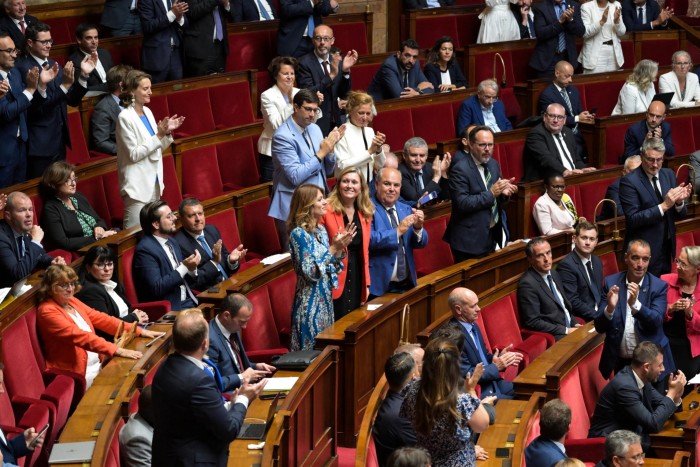
Unlock the Editor’s Digest for free
Roula Khalaf, Editor of the FT, selects her favourite stories in this weekly newsletter.
French politics has been dominated from the Élysée Palace for decades by near-monarchical presidents, from Charles de Gaulle to François Mitterrand to today’s Emmanuel Macron. But another, older institution has unexpectedly now taken centre stage: the National Assembly.
Dating back to the French Revolution of 1789, the assembly is where French politics is likely to play out in the months ahead. It is to the fractious members of parliament at the Palais Bourbon on the left bank of the Seine that Macron must now turn to elicit support for any economic reforms or ambitious plans for European integration.
The assembly has been thrust back into the limelight by the inconclusive legislative election called by Macron in June, which produced no majority for any of the three big groups vying to form a government: the leftwing alliance called the New Popular Front (NFP), Macron’s centrists and the far right under Marine Le Pen.
“There is, somewhat surprisingly, a return of the legitimacy of the National Assembly,” says historian and publisher Olivier Bétourné. “For decades there has been no culture of the National Assembly in France.”
Bétourné says Macron will find it hard because he is used to “the solitary exercise of power” under the Fifth Republic created by De Gaulle in 1958, which tilted power towards the presidency after the argumentative assemblies and fragile governments of the Fourth.
The French left, on the other hand — although split between its different factions from the far left of the former Trotskyist Jean-Luc Mélenchon to moderate Socialists — is in its element in the rough and tumble of the lower house of parliament; it was at the first National Assembly that the political terms “left” and “right” originated because revolutionaries congregated on the left and supporters of the ancien régime on the right.
The left’s plan “is to revitalise the National Assembly, to give it back its independence,” Cyrielle Chatelain, who heads the Greens in parliament, told France Info radio. “The National Assembly becomes once more the beating heart of this republic, the place of political initiative.”
France had a taste of the drama to come at the first sitting last week, when the 577 elected deputies gathered on the red benches of the chamber under the motto “Liberté, Egalité, Fraternité” to elect the head of the assembly.
By chance, it fell to Marine Le Pen’s far-right Rassemblement National, which won the biggest share of the popular vote but came third in the number of seats, to provide both the day’s acting assembly president (81-year-old José Gonzalez, as the oldest deputy) and the monitor of the voting urn (22-year old Flavien Termet, as the youngest).

Gonzalez irritated the left in his opening speech by alluding to his nationalist loyalties and tearily recalling his origins in what was then French Algeria, and many leftists in turn snubbed Termet by refusing to join other deputies in shaking his hand after casting their votes.
By the end of the day, Macron’s supporters had engineered the re-election of his centrist candidate Yaël Braun-Pivet as assembly president. The ostracising of Le Pen’s party was completed the next day when it failed to win any parliamentary posts — a flagrant breach, Le Pen said, of rules and customs given that the RN is the largest single party in the assembly.
“Everything will be decided at the Elysée,” said Jean-Philippe Tanguy, one of Le Pen’s senior deputies “That’s Macron’s plan — to make the National Assembly a black hole from which no light can emerge.”
Neither Macron’s enemies nor his allies, however, believe such a plan could work. Although the French president appoints the prime minister, that premier can do little without the backing of MPs. A Macron majority in the current assembly would need to draw from the Socialists and the centre right as well as the centre.
In the meantime, the renewed importance of the National Assembly in French politics was underlined by the voter turnout in the second round of Macron’s snap legislative election, which at nearly 67 per cent was the highest for 27 years.
Like many other commentators and politicians, the historian Bétourné says it is time to formally reinforce the assembly’s role. “I don’t know if it means the Sixth Republic, but we need to rebalance the executive and legislative powers,” he says. “The government is too dominant in the process of legislation.”